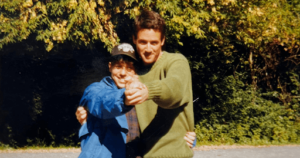Cyberbullying Resources for Parents and Caregivers
As caring and supportive adults, we aspire to guide youth toward becoming compassionate, understanding, and resilient individuals. In a world where social and emotional challenges ...

By Michael Satow
I lost my brother, Jed, to suicide when I was in my early 30s. I had just had my first child when he died. Jed was so excited to be an uncle; my son would have loved him.
Every time someone is lost to suicide, it’s a loss to that person and to everyone around them. When Jed died, it was so difficult because I kept asking the questions, What could I have done? Was it my fault? Was there something I could have done to stop it?
It was an unresolvable tragedy upon a tragedy.
Our family turned this tragedy into resolve. When my parents started The Jed Foundation (JED) nearly 25 years ago, they were determined to find ways to ensure that no family has to go through what we did. They searched for the best approaches and systems to prevent suicide, and looked for the most effective ways to deliver suicide prevention resources to teens and young adults.
Today, JED’s work with schools and communities is far-reaching, as schools implement evidence-based plans to support student mental health, reduce substance misuse, and prevent suicide. These programs and resources reach millions of young people and help them access the support they need to thrive.
It’s clear that the work JED is doing is having an impact. The comprehensive approach JED takes with colleges, universities, and pre-K–12 schools is so exciting — because it’s working. But we need to bring more students under the umbrella of safety. There’s an urgency to get this done as more young people face mental health challenges.
You likely know someone who has been impacted by suicide; the ripple effects of suicide affect all of us. But we can change that.
As the board chair, I see firsthand how far your support of JED goes to help teens and young adults get the mental health support they need. Please join me in supporting JED this holiday season.
If you or someone you know needs to talk to someone right now, text, call, or chat 988 for a free confidential conversation with a trained counselor 24/7.
You can also contact the Crisis Text Line by texting HOME to 741-741.
If this is a medical emergency or if there is immediate danger of harm, call 911 and explain that you need support for a mental health crisis.